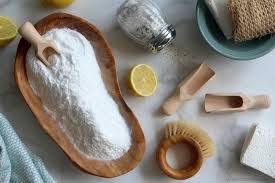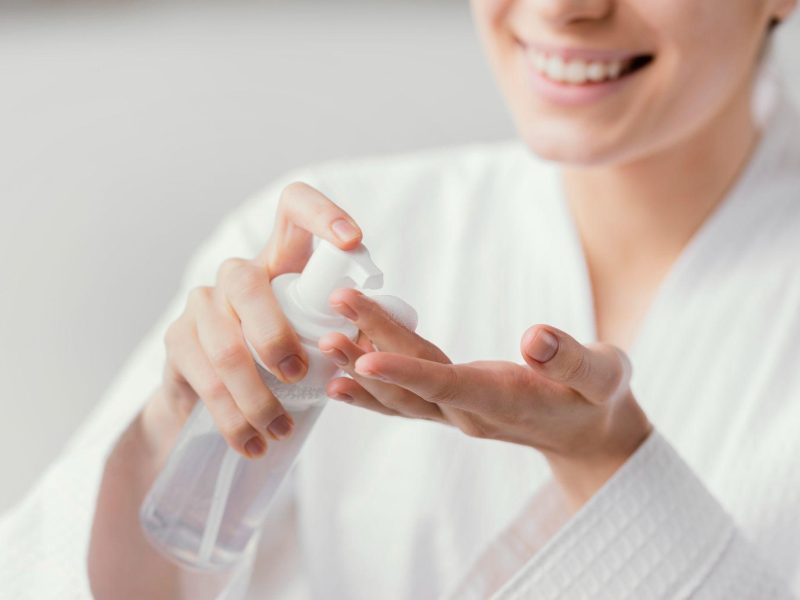Baking soda, also known as sodium bicarbonate, is widely used in baking.
This is because it has leavening properties, which means it expands the dough by producing carbon dioxide.
Beyond cooking, baking soda has a variety of additional household uses and health benefits.
1. Treats Heartburn
Heartburn is also called acid reflux. This is a painful burning sensation that occurs in the upper area of your stomach and can spread down your throat.
It is caused by the reflux of stomach acid into the esophagus, which is the tube that connects the stomach and mouth.
Some common causes of reflux are overeating, stress, and eating greasy or spicy foods.
Did you use Baking soda for heartburn? It can help treat heartburn by neutralizing stomach
acid. Dissolve a teaspoon of baking soda in a glass of cold water and drink it slowly.
You should be aware of the disadvantages of this treatment:
- There is some debate about whether everyone with heartburn symptoms actually has high stomach acid.
- ·Baking soda is very high in sodium, 629 mg per 1/2 teaspoon.
- Continued use may lead to metabolic alkalosis and heart problems.
2. Mouthwash
Mouthwashes are an important addition to good oral hygiene habits. It reaches the corners of your mouth and the crevices of your teeth, gums, and tongue, which may be missed when brushing.
Many people use baking soda instead of mouthwash. Some studies show that it can help freshen breath and even provide antibacterial and antibacterial properties. Does baking soda whiten teeth? Yes, brushing teeth with baking soda can help to whiten teeth as well.
However, one study found that baking soda mouthwash did not significantly reduce oral bacterial levels, although it did cause an increase in saliva pH, which is important for inhibiting bacterial growth.
The recipe for a baking soda mouthwash is simple. Add 1/2 teaspoon of baking soda to 1/2 cup of warm water and rinse your mouth as usual.
3. Soothes mouth ulcers
Mouth ulcers are small, painful sores that can form in the mouth. Unlike cold sores, canker sores do not form on the lips and are not contagious.
Although more evidence is needed, some studies have found that baking soda mouthwashes are very effective in relieving pain from mouth ulcers.
You can make a baking soda mouthwash using the recipe in the previous chapter. Gargle with this mixture once a day until your mouth sores heal.
4. Whiten Teeth
Baking soda is a popular home remedy for teeth whitening.
Numerous studies have found that toothpaste with baking soda whitens teeth and removes plaque better than toothpaste without baking soda.
This may be because baking soda is mildly abrasive and can break the molecular bonds of stained teeth. It also has antibacterial and antibacterial properties that can help fight harmful bacteria.
5. Deodorant
Surprisingly, human sweat is odorless.
Sweat only smells bad when it’s broken down by bacteria in the armpits. These bacteria turn your sweat into acidic waste, which makes it smell bad.
Baking soda can eliminate the smell of sweat by reducing the acidity of the odor. Try dabbing baking soda on your armpits and you may notice a difference.
6. May improve athletic performance
Baking soda, also known as sodium bicarbonate, is a popular supplement among athletes.
Some studies suggest that baking soda can help you look your best for longer, especially during anaerobic exercise or high-intensity training and sprints.
During high-intensity exercise, your muscle cells start producing lactic acid, which is what causes the burning sensation you experience during exercise. Lactic acid also lowers intracellular pH, which can lead to muscle fatigue.
Baking soda has a high pH, which may help delay fatigue and allow you to spend longer at the peak of your workout.
For example, one study found that people who took baking soda exercised an average of 4.5 minutes more than those who didn’t.
One study recommends consuming 300 mg of baking soda per 33.8 ounces (1 liter) of water 1-2 hours before exercise.
Another study added that taking it 3 hours before exercise reduced gastrointestinal discomfort.
7. Relieves itchy skin and sunburn
A baking soda bath is often recommended to soothe itchy skin. These baths are a common treatment for itching caused by bug bites and bee stings.
Additionally, baking soda may help relieve itching from sunburn. Some people claim it’s more effective when combined with other ingredients like cornstarch and oatmeal.
To make a baking soda bath, add 1-2 cups of baking soda to a warm bath. Make sure the affected area is thoroughly soaked.
For more specific areas, you can make a paste with baking soda and a little water. Apply a thick layer of paste to the affected area.
8. May slow the progression of chronic kidney disease
The kidneys in people with chronic kidney disease (CKD) slowly lose their function.
Kidneys are very important because they help remove excess waste and water from the blood. At the same time, they help balance important minerals like potassium, sodium, and calcium.
A study including 134 adults with CKD found that those who took sodium bicarbonate (baking soda) supplements were 36% less likely to experience rapid disease progression compared to those who did not take the supplements).
Always consult your doctor before ingesting baking soda.
9. May improve certain cancer treatments
Cancer is the second leading cause of death worldwide.
It is usually treated with chemotherapy, which works by slowing or stopping the growth of cancer cells. Typically, cancer cells grow and divide at a rapid rate.
Some research suggests that baking soda can help chemotherapy drugs work more effectively. Baking soda may make the tumor environment less acidic, which is beneficial for chemotherapy.
However, evidence is limited to preliminary indications from animal and cell studies, so more human-based studies are needed.
If you’ve tried to lose weight fast but haven’t seen the effect of weight loss tea or medicine, you can buy an online weight loss checklist just for you from an online nutritionist ( click to start losing weight )
10. Clean fruits and vegetables
Many people worry about pesticides on food. Pesticides are used to protect crops from damage by insects, bacteria, rodents and weeds.
Peeling fruit is the best way to remove pesticides. However, it also means you don’t get many of the important nutrients found in fruit peels, such as fiber, vitamins and minerals.
Interestingly, recent research has found that soaking fruits and vegetables in a baking soda wash is the most effective way to remove pesticides without peeling them.
One study found that soaking apples in a solution of baking soda and water for 12-15 minutes removed nearly all pesticides.
Note that this method will not remove pesticides that have penetrated the skin of the fruit. More research is needed to see if this applies to other types of products.
Conclusion
Baking soda is a versatile ingredient that has many uses beyond cooking.
It does a great job of eliminating odors and cleaning. This household staple can help remove stubborn stains, eliminate odors, and clean difficult areas like ovens, microwaves, and tile grout.
Additionally, baking soda has several health benefits. For example, it can help treat heartburn, relieve mouth ulcers, and even whiten teeth.
What’s more, baking soda is cheap and widely available. You can grab a bottle of baking soda from your local grocery store.
Also Read: Chalene Johnson Plastic Surgery


